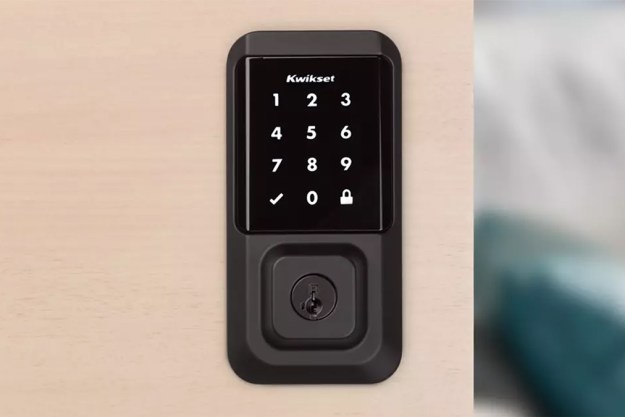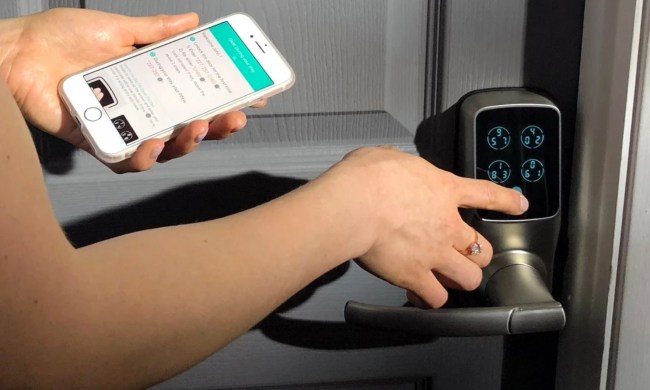
“You won't find a sturdier smart lock, but the functionality is questionable.”
- Durable construction
- Versatile entry
- Must replace your deadbolt
- Poor installation experience
- Touchpad is a hassle
The Halo by Kwikset is a smart lock that be controlled using an app, codes, or an old fashion set of keys. This versatility, paired with super tough hardware, seems like winning combination. But while the Halo has a lot going for it, there are a few shortcomings that make it less practical than it looked at first glance.
Installation
The Halo is harder to install than some locks, because you have to take out your current deadbolt and install a new one. Other door locks, like the August Smart Lock or the Wyze Lock, fit over your existing deadbolt, making the transition easier. If you’re not mechanically inclined (like myself), you may find getting the old deadbolt out, and putting the new one in, frustrating.
If you don’t need to install a new deadbolt, why would you?
In fact, Kwikset’s instructions say you may need a wood chisel during installation. I’m not sure how many households have a wood chisel on hand, but I’m guessing rather few.

My biggest installation frustration, though, was due to the app. The quick start guide tells you to download the app. You then need to follow the on-screen instructions to install the lock. A paper guide isn’t included in the box.
However, I had to switch screens to answer a text. When I came back to the app, it insisted I go through a long, drawn out account sign up process. When that was done, it didn’t take me back to the installation process. I had to find it again, and then try to find the installation screen I was at before the interruption. That seems like a usability fail to me.
Durability
The most trait of this smart lock is its toughness. The Halo is kick-proof, fire resistant for up to 20 minutes, pick resistant, and hardened against drills or saws. Even the connecting wires inside are reinforced. This is one sturdy lock. You can tell just by its heft that it’s made to last.
Keypad and access

While the Halo has a keypad that lights up for easy viewing, it doesn’t escape the inherent problems with touch pads.
The big issue is sensitivity. You need to touch the pad to activate it, and then type in your key code. I found that if I didn’t type in my code fast enough, within seconds, the pad would go to sleep and wouldn’t wake back up. I’d stand around, tapping the screen impatiently, trying to get it to come back to life for a minute or two. If you’re in a hurry to get inside, this is a no-go.
Also, the keypad shows fingerprints clearly. That means a would-be crook could take a look at the pattern of fingerprints on the touchpad and come up with your code easily. I tried wiping the touchpad after using it, but who is really going to clean off their lock every time they use it?
One feature I like is that you can use the app to turn off the keypad altogether. Then, you can use your keys or the app to control the locking and unlocking of your door. It undermines the whole point of a smart lock with a keypad, but that tells you how much I don’t like the Halo’s keypad.
It’s a shame, because this lock can store up to 250 user codes, complete with time limits and expiration dates that you can control through the app. I can see where that would come in handy.
The alarm didn’t work
One of the features I liked when I first learned of the Halo is that an alarm sounds if the code is entered incorrectly three times. This would instantly let you know if someone was trying to figure out your code and break into your home.

So, in the interest of science, I tried it out. I entered three random codes, and to my dismay, nothing happened. No alarm sounded. No notification popped up on my phone. Other attempts haven’t yielded an alarm, either.
I contacted the company’s support team, and they said it may be due to low batteries or the connection coming loose. Neither seemed to be the cause. So far as I can tell, the feature simply doesn’t work as advertise.
Our take
The Kwikset Halo is disappointing. The keypad is a hassle, and installing a new deadbolt is a big turn off. At $229, other smart locks are priced better and work better.
Is there a better alternative?
Yep. The August Smart Lock Pro is only $85, and it works with your current deadbolt. If you want a smart lock with a keypad, opt for the Nest X Yale or the Schlage Encode. They cost about the same, but these locks function better overall.
Will it last?
Absolutely. It’s a beast. Plus, it comes with a lifetime warranty.
Should you buy it?
The Halo doesn’t have a match when it comes to its strength and toughness, but the tech isn’t great. Pass on this one.



